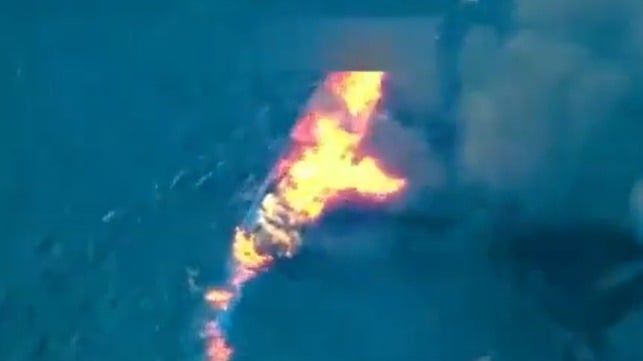White House Releases Video of Third Caribbean Boat Strike

On Friday, the Trump administration announced a third strike on a suspected smuggling boat in the Caribbean, resulting in the deaths of three individuals on board. The attack brings the fatality count for the new interdiction campaign to 17 in total.
According to a statement on the president's social media platform, Truth Social, the strike occurred in international waters in U.S. Southern Command, and no U.S. forces were harmed. The previous two attacks were reportedly carried out by drone operators working for U.S. Special Operations Command (SOCOM), without prior boarding or attempts at arrest - a departure from the previous Coast Guard-led law enforcement effort in the Caribbean.
The strike appears to have been far from Venezuelan shores. Officials in the Dominican Republic reported Sunday that the National Drug Control Directorate (DNCD) and the Dominican Republic Navy (ARD) followed up after the U.S. air strike on the speedboat, working in conjunction with U.S. forces. The Dominican authorities reportedly seized 377 packages of cocaine at a position about 80 nautical miles south of Beata Island, closer to Dominican shores than to Venezuela.
The US bombed a third boat off Venezuela coast. pic.twitter.com/1tGPBWg95f
— MenchOsint (@MenchOsint) September 20, 2025
Lawyers within the Pentagon are reportedly concerned about what the strikes could bring for the military personnel involved, who could bear personal liability in the event that a court determined that these interdictions are unjustified. The current Authorization for Use of Military Force (AUMF), the congressional act that authorizes the White House to take lethal action abroad, dates back to 2001. It is limited to Al-Qaeda and other jihadist groups with ties to the 9/11 attacks. Some military lawyers and retired JAG officers believe that the authorization does not extend to cocaine traffickers, even if the White House has declared a Venezuelan gang to be a terrorist organization, and there is active debate over whether the president's Article II powers (as Commander in Chief of the Armed Forces) extend to lethal force against noncombatants.
The individuals on the boats were likely fishermen with a side business in cocaine logistics, local residents on the Paria Peninsula of Venezuela told AP. With Venezuela's economy in tatters and the region's fisheries depleted, locals have few ways to make a living, and occasional trips for cocaine smugglers and human traffickers offer those with workboats a way to live well. The smuggling boats are reportedly easy to distinguish because of their large, powerful and plural outboards, which deliver far more horsepower than the equipment used by "legitimate" fishermen.

that matters most
Get the latest maritime news delivered to your inbox daily.
The strikes have caused concern among the peninsula's entire fishing community, not just those engaged in illicit trade. President Donald Trump has warned that Venezuelan fishermen might not want to go out right now, and many of them agree; anecdotally, fishing activity off the coast has fallen. Venezuela's National Aquatic Institute has announced a ban on fishing more than 30 miles off of the northern Paria Peninsula, and the Venezuelan military has pledged to protect fishing interests in the area.
"I'm afraid to go fishing because of the situation they're doing to us, because it's not anyone's fault what's happening. In reality, one goes out to work fearfully to earn their daily bread," fisherman José Machado told Telemundo.
